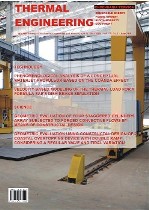PHENOMENOLOGICAL ANALYSIS OF A CONCEPTUAL WATERJET PROPULSOR BASED ON THE COANDA EFFECT
DOI:
https://doi.org/10.5380/reterm.v18i1.67023Keywords:
propellers, CFD analysis, Coanda effect, waterjet propulsionAbstract
This work is part of a research project conceived at the Federal University of Rio Grande. The project aims to create and develop mechanical devices that use the Coanda effect to enhance their overall efficiency. The focus herein is analyzing the physical phenomenon occurring in a conceptual water-jet propulsor. In the proposed concept, a water-jet propulsor has its impeller replaced by injectors that produce the so-called Coanda effect, increasing thereby the mass flow rate. In order to simulate the flow through the propulsor, a numerical model was developed. In this model the time-averaged conservation equations of mass and momentum were solved numerically by the finite volume method, more precisely with the commercial package ANSYS FLUENT (version 14.0). For the closure of the constitutive equations, the k-ω URANS turbulence model was employed. The simulation was performed for a transient state with a timestep of ∆t = 1×10-3 s and a total physical time of t = 6.0 s. Static pressure fields, streamlines and speed profiles are used to analyze the equipment performance and the phenomenon occurrence. The results show that the Coanda Effect is able to generate thrust in a waterjet propulsion device without impeller. The study suggests that the employment of this principle has promising applicability in marine propulsion and deserves attention on future works.
Downloads
Published
How to Cite
Issue
Section
License
Direitos Autorais para artigos publicados nesta revista são do autor, com direitos de primeira publicação para a revista. Em virtude da aparecerem nesta revista de acesso público, os artigos são de uso gratuito, com atribuições próprias, em aplicações educacionais e não-comerciais.



